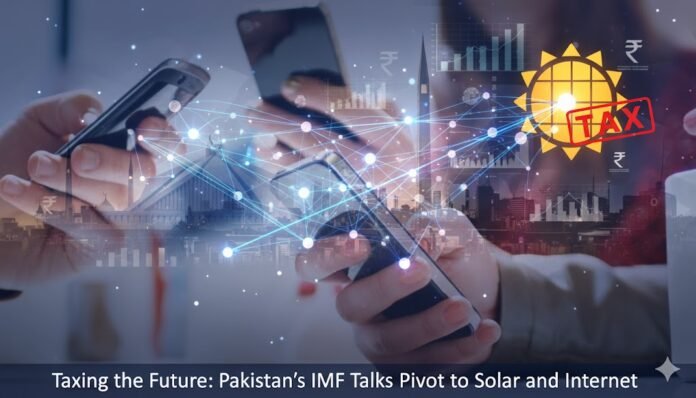The IMF discussions center around Taxing the Future of Pakistan’s economy. This involves controversial new taxes on imported solar panels and internet services.
For the people of Pakistan, the conversations currently taking place between the country and the IMF (International Monetary Fund) are generating both interest and possible irritation. The government is working on emergency taxation plans following the rejection of new taxes on fertilizers and farming pesticides, the government is now considering emergency taxation on the imports of solar panels and the internet. The political decision involves taxing the future.
The emergency tax review regarding imported solar panels and internet services will most likely be included in the second report concerning IMF loan reviews for Pakistan. However, these taxes would only be enacted if government revenues appear to be in deficit between July to December 2025 or if the government expenditures forecasted by the finance minister are deemed reckless. This framework for taxing the future aims for fiscal stability.
Solar energy has the most significant change. Starting January 2026, the Federal Board of Revenue will increase the General Sales Tax on solar panels from 10 percent to 18 percent. It brings to question, why increase the tax on solar energy which helps countless people struggling with energy from the grid? This proposal, seen by many as taxing the future, is highly controversial.
The answer to this question is because of the increasing capacity payment costs, which are fixed charged payments to energy producers and paid by the government whether the energy is used or not. Pakistan is predicted to reach 1.7 trillion rupees regarding the capacity payments. The more people with solar panels, the less energy they consume through the national grid. This ironically increases the fixed capacity payment burden on people still using the grid. The economic rationale for taxing the future is complex.
The government is trying to control the swift development of solar energy and its self-sufficient use. This clearly illustrates that the old ways of managing energy resources is finding it hard to cope with new clean energy innovations. Officials are grappling with the unintended consequences of clean energy adoption, potentially leading to taxing the future of green energy.
The government has also been trying to widen the tax net digitally.There has been talk about raising the withholding tax on online services from 15% to 18% or even 20%. This applies to every remote worker, online student, every business, and all mobile phone users. This expansion is another key component of taxing the future.
For a Pakistani family, taxing the internet is not a trivial. educational opportunities and access to information. Most severe obstacles are the limitations on communication, trade, and the monetary relative trade-offs that the modern dollar offers. Families are concerned about how taxing the future of digital access will impact daily life.
The government is under immense pressure to meet its IMF program revenue targets. Shifting the focus from politically sensitive agricultural taxes to solar and internet is a clear sign of this pressure. These ‘emergency’ measures are an attempt to shore up revenues without derailing the stability program. This is a difficult political choice regarding taxing the future.
These tax considerations highlight an overlooked aspect of our system. There is a need to increase Pakistan’s tax base; however, taxing the most low-hanging fruit conflicts with national priorities like the digital leap, clean energy, and digital literacy. The current proposals involve a critical decision on taxing the future of technological advancement. While the Fiscal Board of the IMF is about to finalize its decision, the citizens of Pakistan wonder if the balancing act is being done on the budget, the sun, and the screens, and what the final implication of taxing the future will be.



